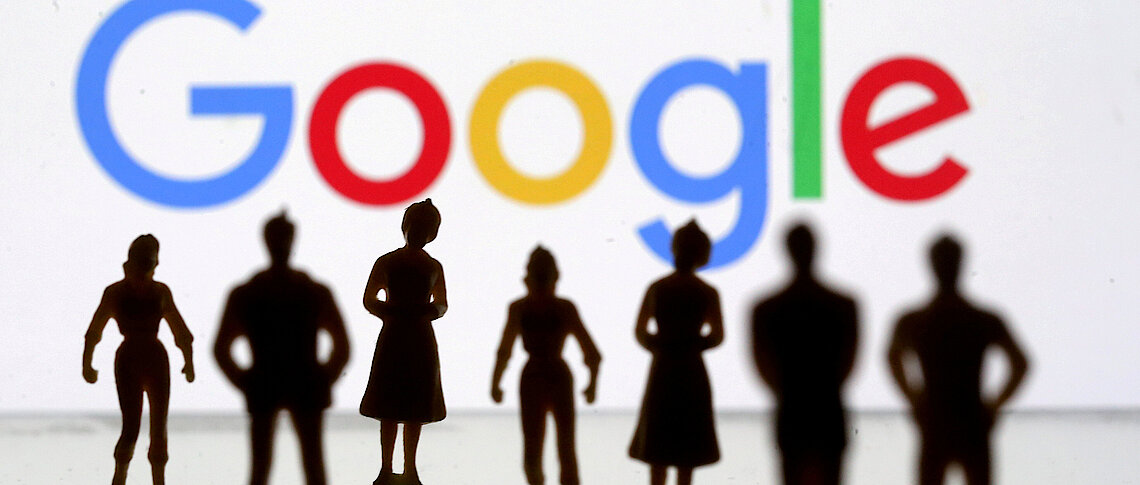Read this article in German.
The new year was just a few days old when Chewy Shaw decided to start it off with a bang: in an opinion piece for the New York Times they long-serving software developer at search-engine company Google announced that, along with 400 other employees of Alphabet, he had set up the Alphabet Workers Union. ‘For far too long, thousands of us at Google — and other subsidiaries of Alphabet, Google’s parent company — have had our workplace concerns dismissed by executives,’ he wrote, adding that Google’s ‘motto used to be “Don’t be evil”.’ In quoting this famous resolution, he implicitly questioned the extent to which the company still takes its founding ambition seriously.
The setting up of worker’s representation in Silicon Valley, a milieu typically hostile to the idea of organised labour, was an unexpected move – and is nothing short of a historical watershed inasmuch as companies like Microsoft, Apple, and indeed Google have, to date, always managed to stifle any attempts by their core business staff to unionise. This led to a situation in which the companies’ security operatives, cafeteria personnel, and cleaning teams were, as standard, members of their usual trades unions while software developers and tech workers remained unable to set up their own representation. Alphabet Workers Union is an absolute first.
What Shaw and his colleagues have come together to pursue is not the usual set of union goals – higher salaries, better bonuses, or shorter working hours. Primarily, they intend to pressure their management into accepting more social and political responsibility. ‘Our bosses have collaborated with repressive governments around the world. They have developed artificial intelligence technology for use by the Department of Defense and profited from ads by a hate group,’ wrote Shaw, who has often criticised his employer – to no avail: ‘Each time workers organize to demand change, Alphabet’s executives make token promises, doing the bare minimum in the hopes of placating workers.’
A history of resistance in tech
Alphabet is not the only Silicon Valley tech giant which finds its employers pushing it to take on more social and political responsibility. In fact, since it became known several years back that the tech industry behemoths had entered into thousands of contracts with the Department of Defense, US Immigration and Customs Enforcement (ICE), the Drugs Enforcement Administration (DEA), and the Federal Bureau of Investigations (FBI), an increasing number of their employees have come out in public against the corporate policies of their employers. In 2018, for example, hundreds of Microsoft workers protested against a contract with ICE, while staff at Amazon called on their boss Jeff Bezos to cancel the sale of facial recognition software developed by Palantir to US law enforcement agencies, arguing that it would be used ‘to harm the most marginalized’.
Yet it was the Google management that received the loudest criticism from its staff. In 2018, more than 20,000 of the company’s staff downed tools to protest against Google’s approach to tackling sexual harassment; others attempted to stop corporate decisions they considered to be unethical, such as an agreement to provide technology to the Customs and Border Protection unit of the Department of Homeland Security or cooperation with the Chinese government on the development of a censored search engine. ‘Google et al. recruited people by promising them that they would be working in a different kind of company – one that is, above all, transparent and pursuing a mission to make the world a better place,’ explains Margaret O’Mara, a historian of Silicon Valley who holds a professorship at the University of Washington. ‘Now, as employees, they are demanding that their employers make good on the promises they made.’
The fact that companies like Google and Microsoft have been able to withstand attempts in their workforces to organise for so long is partly due to the provisions of American labour law, which ‘make it all too easy to simply fire workers who are critical of management’.
Up to now, however, the protests have not led to unions gaining significant ground in Silicon Valley. Indeed, for decades now, American Big Tech has done everything it can to keep its core employees from organising. ‘In the early days of Silicon Valley, there was a strong utopian vibe going around,’ continues O’Mara, ‘and whereas in corporates on the East Coast staff had been pitted against management, there was a desire to prevent that kind of animosity from arising.’
‘In the logic of those times, even the existence of a union was a sign that management was doing something wrong.’ The result was that tech company executives did everything they could to keep their workers satisfied, offering competitive salaries, generous share packages, and good healthcare benefits – even extending this policy to production-line workers making chips and devices – in order to keep unions at bay. The aim was to keep employees happy, and powerless.
The deep-rooted anti-unionism in Silicon Valley
This approach remains deeply rooted in Silicon Valley corporate culture. In addition to attractive stakes in the companies they work for, tech workers can expect to earn USD 200,000 annually on average (i.e. seven times what an average American worker gets). If for no other reason than this, companies like Google argue that there is no need for employee representation: after all, pay and conditions are more than just fair, right?
According to O’Mara, the real reason for Big Tech’s hostility to unions is quite another, however: ‘There is a lot of concern that a surge in employee entitlements could hem in the rapid growth of the tech giants. Essentially, unionised workers simply wouldn’t offer these companies the flexibility they require. We’re talking about an industry which needs to be able to add new workers quickly,’ she adds, ‘and shed them just as quickly if demand changes.’
This argument was made decades ago, back in the beginnings of Silicon Valley, by none other Robert Noyce, one of the founders of chip manufacturer Intel: ‘Remaining non-union is essential for survival for most of our companies. If we had the work rules of union companies, we'd all go out of business.’ What Noyce and his co-founders saw in the hi-tech West Coast was the opportunity to break out of the traditional model of employment – and to make building cars or mining ore easier.
The flaws in US labour law
The fact that companies like Google and Microsoft have been able to withstand attempts in their workforces to organise for so long is partly due to the provisions of American labour law, which ‘make it all too easy to simply fire workers who are critical of management’, according to Nelson Lichtenstein, Professor at the Center for the Study of Work, Labor and Democracy an der University of California, Santa Barbara. ‘Although it isn’t legal to fire someone just for setting up a union, that doesn’t stop the tech companies finding other grounds,’ adds the labour historian who has been researching this area for decades.
Indeed, only a month ago, federal prosecutors found that Google may have unlawfully dismissed two members of staff who protested against the company’s cooperation with the immigration authorities in 2019. And in late 2020, respected tech ethics researcher Timni Gebru, too, found herself on the wrong side of the company – and was fired while on holiday.
Currently, the collective has just 800 members in a corporation employing over 120,000 people. Yet, according to Professor Lichtenstein, the union’s power is immense.
In a research paper released prior to her dismissal, Gebru had criticised the degree to which artificial intelligence was increasingly escaping from human checks and balances with the result that algorithms were discriminating against minorities without developers noticing – including at Google. Defending the company’s decision to dismiss Gebru, the head of its artificial intelligence unit Jeff Dean said that her paper did not ‘meet the company’s standards for publishing’ and ‘ignored too much relevant research’ into recent positive developments in the field.
Liechtenstein stresses that this kind of incident is by no means isolated – primarily, in his view, because the companies have no consequences to fear. ‘Penalties for unlawfully dismissing unionised workers are pathetic,’ he explains: ‘If they get caught, all employers have to do is to offer the worker their old job and back-pay their wages since dismissal. Most don’t want their old job back, though.’
It’s all about the company image
As yet, it is not clear what, if anything, the newly-formed Alphabet Workers Union will be able to change: in contrast to traditional trades unions, who aim to represent a majority of workers at a given company or in a given department, it sees itself as a minority representation; this makes it less powerful and affords it no collective bargaining rights. Nevertheless, the Alphabet Workers Union will offer some protection to members and may serve a basic structure within which to coordinate activities.
Currently, the collective has just 800 members in a corporation employing over 120,000 people. Yet, according to Professor Lichtenstein, the union’s power is immense: ‘There is nothing more potent than when staff speak out against their own company and start to exert pressure on it. Setting up the union is sending a signal.’
In the tech industry, image is key. ‘While the value of the company rests primarily on its technological know-how,’ explains Lichtenstein, ‘its brand image is a substantial element in the equation, too. If staff start to make concerted calls to action against the company, that’s bad for the company’s reputation. All the more so given that a typical union tactic is to go public to draw attention to internal issues.’
O’Mara is yet to be convinced that the Alphabet Workers Union will become a trailblazer for the whole tech industry: ‘Getting workers unionized in the private sector has never been an easy thing to do, and Big Tech firms have huge financial resources with which to lobby lawmakers and push back against attempts to organise their staff,’ adding that ‘although hundreds have joined the Google union, hundreds are not the same as thousands. Nevertheless, while we don’t know how it will all end, this is still nothing short of historic.’






